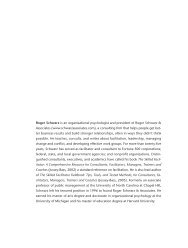The Skilled Facilitator Approach - Roger Schwarz
The Skilled Facilitator Approach - Roger Schwarz
The Skilled Facilitator Approach - Roger Schwarz
You also want an ePaper? Increase the reach of your titles
YUMPU automatically turns print PDFs into web optimized ePapers that Google loves.
34<br />
At one time or another, I have experienced each of these feelings as a facilitator;<br />
they are part of the internal work of facilitation. <strong>The</strong> <strong>Skilled</strong> <strong>Facilitator</strong> approach<br />
enables you to become more aware of these feelings and increases your ability to<br />
manage them productively—what some refer to emotional intelligence (Goleman,<br />
1995; Salovey and Mayer, 1990). I have found that my ability to develop these emotional<br />
skills is both distinct from and related to my larger set of knowledge, skills,<br />
and experience as a facilitator. Although there are many ways to improve my facilitation<br />
skills that do not focus on dealing with my emotions, my use of any of<br />
these skills becomes more powerful if I am attuned to my feelings and to others’<br />
feelings and deal with them productively.<br />
Through facilitating groups, you also come to know yourself by reflecting on<br />
how you react to certain situations, understanding the sources of your feelings,<br />
and learning how to work with your feelings productively. In doing so, you not only<br />
help yourself but increase your ability to help the groups with which you work.<br />
CONCLUSION<br />
<strong>The</strong> <strong>Skilled</strong> <strong>Facilitator</strong> approach is based on a set of core values. Using a systems<br />
thinking approach, it enables you to clearly define your facilitator role and develop<br />
explicit agreement with a group about how you will work together. Together, the<br />
core values, the group effectiveness model, the ground rules, and the diagnosis-intervention<br />
cycle help you identify functional and dysfunctional aspects of the group<br />
and intervene to help the group increase its effectiveness. <strong>The</strong> approach enables<br />
you to explore and change how you think and improve your ability to facilitate difficult<br />
situations. It also helps groups explore and change their thinking to help<br />
them create fundamental change. All of the elements in the <strong>Skilled</strong> <strong>Facilitator</strong> approach<br />
are integrated to enable both group members and the facilitator to create<br />
collaborative relationships in which they can learn with and from each other. <strong>The</strong><br />
core values, principles, and methods of the <strong>Skilled</strong> <strong>Facilitator</strong> approach are equally<br />
applicable to facilitative leaders, consultants, coaches, and trainers.<br />
<strong>The</strong> IAF Handbook of Group Facilitation



